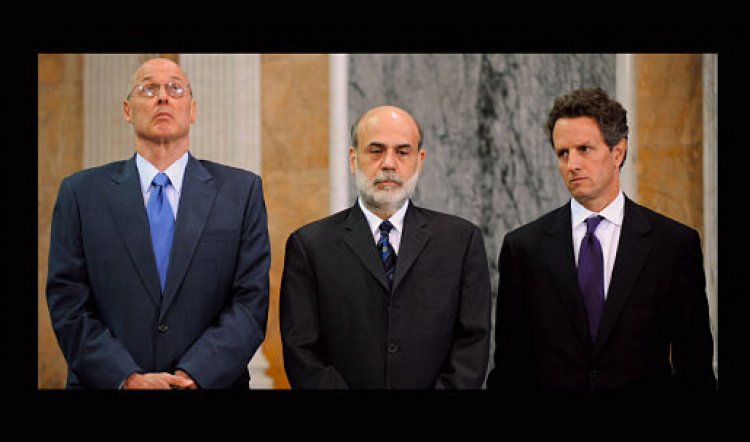
INSIDE JOB
INSIDE JOB, produced/directed by Charles Ferguson; 2 hours, rated PG. Photos: (l-r: prime shifty types) Henry Paulson (former US Secretary of the Treasury), Ben Bernanke (Chairman of the US Federal Reserve) and Timothy Geithner (US Secretary of the Treasury; former President of the Federal Bank of New York) right: Charles Ferguson
ONE OF THE BEST THINGS about Inside Job is the title. It’s about crooks. It’s the language we use to talk about crime. Stuff that’s against the law. Never mind the genteel distinction we make for white collar criminals. A crook is a crook. A heist is a heist. You steal something that belongs to someone else you’re a crook. Why should it be different when it’s banks and top level corporate shonks doing the robbing? Crooks usually go to jail. Especially if they steal a lot. And of course they go directly to jail if they’re from the wrong side of the tracks and can’t afford a fancy lawyer, or serried ranks of fancy lawyers, which is what the robber bankers in this story have at their disposal, fending off the merest suggestion that they might be, heaven forbid, crooks. Leaving them free to scarper with their ill-gotten gains and take up new appointments at the top of the post-catastrophe pecking order. As indeed, in this case, they have.
You don’t expect too many interesting moments at the Academy Awards. They seem to get squirmier with every passing year, with every groaningly stage-managed presenter’s quip, every not-so-humbled-they-don’t-still-rabbit-on-endlessly thank-you speech. But there was one really memorable moment this time round when Charles Ferguson, Inside Job’s producer/director got up to receive the Best Documentary Award. Instead of reeling off the usual numbing litany, he delivered just the one crisp and cranky comment about what has happened in the wake of the colossal financial crime perpetrated on the working stiffs of the world, which his film so meticulously chronicles.
“Forgive me,” he said after Oprah handed over the gong, “I must start by pointing out that three years after our horrific financial crisis caused by massive fraud, not a single financial executive has gone to jail, and that's wrong.”
That Ferguson was angry was apparent. When you see the film you understand that he was boiling with outrage as he put it together – though he channels it very effectively, fuelling a cold hard determination to spell out the facts with remorseless clarity, leaving absolutely no doubt about where the responsibility lies for the catastrophic events that brought the business world to its knees, propelled thousands of hapless householders into life on the streets and left breathtaking numbers of workers staring down a bleak future as jobs evaporated around the world.
But if Ferguson tries to keep it cool, from an audience perspective it’s impossible not to pick up on the bass note of barely concealed fury that simmers away under his measured and meticulous explanation of what happened, who did it, and how. Impossible not to feel huffy as well, as the story unfolds, chapter by convincing chapter, with Matt Damon’s strong, sensible persona adding heft to the narration. If you’re nursing even a vaguely ruffled feeling of having been done over by the bailouts for the poor old banks (“Where’s MY bailout?” reads the plaintive sign held up at one point by a casualty staking out the sidewalk), your blood pressure may be hitting the heights by the end of this story. In the cinema I attended, there was a crescendo of harrumphs of disgust from the packed audience as Ferguson’s explanation proceeded. And a loud chorus of mutinous mutterings towards the end as the prime suspects were rolled out for our inspection – re-invented, re-bonused and, most notably, celebrating high level re-appointments up to and at Obama White House level – after the film had indelibly indentified them as filthy rich, money-grubbing bastards.
This is, after all, an astounding saga, when it is laid out so accessibly. And that’s the beauty of Ferguson’s film. For the uninitiated this stuff is reasonably complicated, but a little bit of clear explanation goes a long way. And it is not difficult to take on board the history as Ferguson tells it: the deregulation of the financial services industry in the 1980s and ’90s, the ballooning real estate bubble, the explosion of subprime lending, the risk-taking madness of the burgeoning enthusiasm for complex derivatives and the disturbing take-up in the philosophy we thought was confined to Wall Street melodramas, that greed is good and anything goes in pursuit of it.

In retrospect the footage Ferguson selects from the past takes your breath away, interspersed as it is with high gloss footage of the gleaming corporate world, the towering spires of the business districts of the world where money is worshipped. There’s the self serving advice that was given by “expert sources” all the way along the road to the inevitable pileup, the much reported speeches given by much reported figures approving the house of cards as it grew to impossible heights and teetered on the precipice of collapse; and the few lone, horrified voices that did speak out, only to be dismissed as Luddites, sadly out of touch with the untrammeled profit-making that was possible in the brave new unregulated world.
What you can’t help thinking as you watch all this is that it might be a bit complicated, but it’s not rocket science and it’s not okay that it is so often treated that way by a media that, by and large, takes the attitude that we’re not smart enough to have the business of money explained to us. What’s happening to our money, including what’s being done to it by the gambling addicts who frequent the casinos known as stock markets, is mostly treated in the news media as a field best left to the experts. Too complex for the likes of us. So never mind the vested interests, let’s interview another banker. Or a corporate heavy hitter. Or even better, an economist. Or an academic. Even if, as Ferguson acidly observes in his film, their research is funded – as it is increasingly in a world where academics are under pressure to just make money – by the very entities they’re meant to be analysing.
Ferguson’s plea from the Academy’s podium, like his film, makes it clear that he wants us to pay attention. And there is more than one bottom line in the cautionary tale he urges us to consider. He certainly wants us to understand how we were scammed, and to be warned that it could happen again. But he also wants us to consider the morality of the behaviour he has so effectively skewered. Disgust is certainly in the air as we walk away. What is it with this obsession with money? What is it with this lack of honour, this lack of shame, this total lack of caring for the people whose fate is lost sight of in the dizzying fog of money madness?
At one point as we watch yet another high level crook furiously bullshitting in response to Ferguson’s tough questioning, you hear him exclaim off camera in sheer exasperation, “You can’t be serious!” That they are, is terrifying. That he persisted in the face of such intransigence, because he knows just how terrifying it is, is remarkable.



